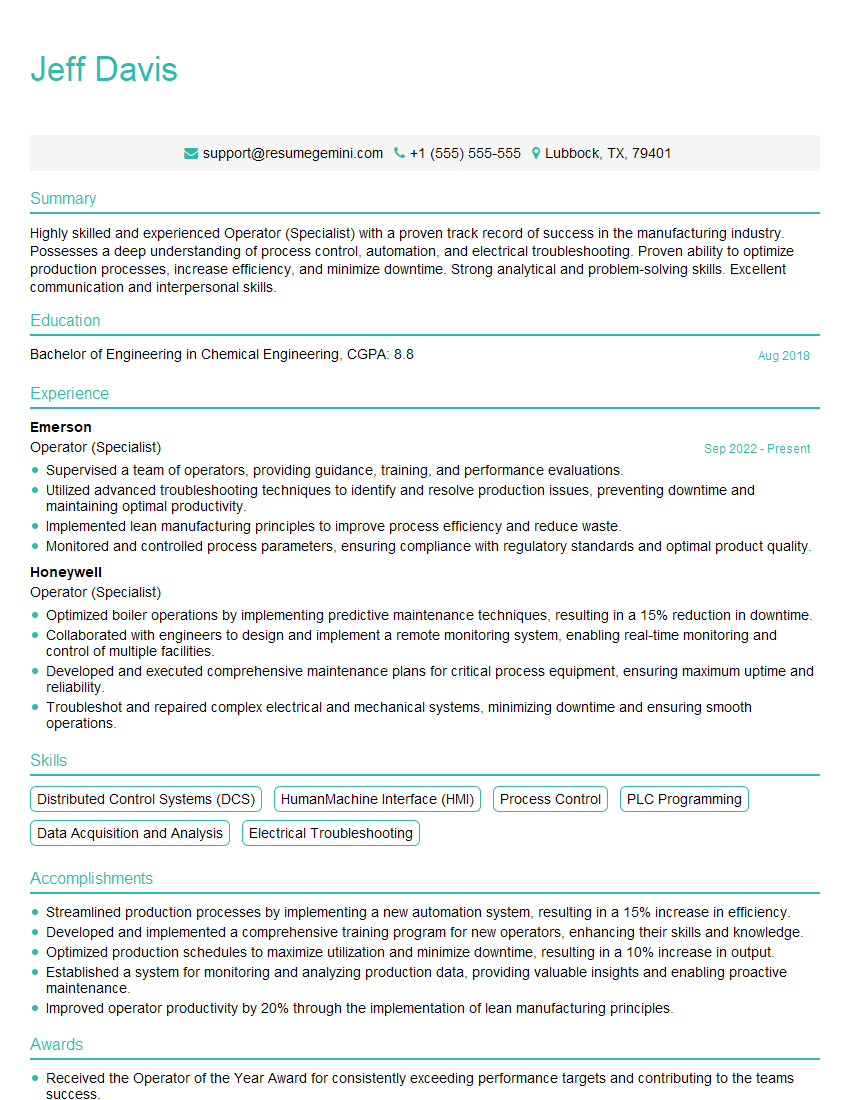Are you a seasoned Operator (Specialist) seeking a new career path? Discover our professionally built Operator (Specialist) Resume Template. This time-saving tool provides a solid foundation for your job search. Simply click “Edit Resume” to customize it with your unique experiences and achievements. Customize fonts and colors to match your personal style and increase your chances of landing your dream job. Explore more Resume Templates for additional options.

Jeff Davis
Operator (Specialist)
Summary
Highly skilled and experienced Operator (Specialist) with a proven track record of success in the manufacturing industry. Possesses a deep understanding of process control, automation, and electrical troubleshooting. Proven ability to optimize production processes, increase efficiency, and minimize downtime. Strong analytical and problem-solving skills. Excellent communication and interpersonal skills.
Education
Bachelor of Engineering in Chemical Engineering
August 2018
Skills
- Distributed Control Systems (DCS)
- HumanMachine Interface (HMI)
- Process Control
- PLC Programming
- Data Acquisition and Analysis
- Electrical Troubleshooting
Work Experience
Operator (Specialist)
- Supervised a team of operators, providing guidance, training, and performance evaluations.
- Utilized advanced troubleshooting techniques to identify and resolve production issues, preventing downtime and maintaining optimal productivity.
- Implemented lean manufacturing principles to improve process efficiency and reduce waste.
- Monitored and controlled process parameters, ensuring compliance with regulatory standards and optimal product quality.
Operator (Specialist)
- Optimized boiler operations by implementing predictive maintenance techniques, resulting in a 15% reduction in downtime.
- Collaborated with engineers to design and implement a remote monitoring system, enabling real-time monitoring and control of multiple facilities.
- Developed and executed comprehensive maintenance plans for critical process equipment, ensuring maximum uptime and reliability.
- Troubleshot and repaired complex electrical and mechanical systems, minimizing downtime and ensuring smooth operations.
Accomplishments
- Streamlined production processes by implementing a new automation system, resulting in a 15% increase in efficiency.
- Developed and implemented a comprehensive training program for new operators, enhancing their skills and knowledge.
- Optimized production schedules to maximize utilization and minimize downtime, resulting in a 10% increase in output.
- Established a system for monitoring and analyzing production data, providing valuable insights and enabling proactive maintenance.
- Improved operator productivity by 20% through the implementation of lean manufacturing principles.
Awards
- Received the Operator of the Year Award for consistently exceeding performance targets and contributing to the teams success.
- Recognized for exceptional troubleshooting skills and ability to resolve complex technical issues under pressure.
- Earned the Safety Excellence Award for maintaining a spotless safety record and promoting a culture of safety in the workplace.
- Received the Technical Innovation Award for designing and implementing a groundbreaking solution that significantly improved production efficiency.
Certificates
- Certified Control Systems Technician (CCST)
- Certified Maintenance and Reliability Professional (CMRP)
- OSHA 30Hour Safety Course
- CPR and First Aid Certification
Career Expert Tips:
- Select the ideal resume template to showcase your professional experience effectively.
- Master the art of resume writing to highlight your unique qualifications and achievements.
- Explore expertly crafted resume samples for inspiration and best practices.
- Build your best resume for free this new year with ResumeGemini. Enjoy exclusive discounts on ATS optimized resume templates.
How To Write Resume For Operator (Specialist)
- Quantify your accomplishments with specific metrics and results whenever possible.
- Highlight your skills in process control, automation, and electrical troubleshooting.
- Demonstrate your ability to optimize production processes and increase efficiency.
- Emphasize your experience in implementing lean manufacturing principles.
- Showcase your strong analytical and problem-solving skills.
Essential Experience Highlights for a Strong Operator (Specialist) Resume
- Operate and monitor production equipment, including DCS, HMI, and PLCs
- Troubleshoot and resolve process deviations, electrical faults, and mechanical issues
- Develop and implement training programs for new operators
- Optimize production schedules to maximize utilization and minimize downtime
- Establish and maintain system for monitoring and analyzing production data
- Implement lean manufacturing principles to improve operator productivity
- Collaborate with engineers and maintenance technicians to ensure smooth operation of production lines
Frequently Asked Questions (FAQ’s) For Operator (Specialist)
What is the role of an Operator (Specialist)?
An Operator (Specialist) is responsible for operating and maintaining production equipment, troubleshooting process deviations, and implementing process improvements.
What are the key skills required for an Operator (Specialist)?
Key skills include process control, automation, electrical troubleshooting, data analysis, and lean manufacturing principles.
What are the career prospects for an Operator (Specialist)?
Experienced Operators (Specialists) can advance to positions such as Production Supervisor, Process Engineer, or Maintenance Manager.
What are the educational requirements for an Operator (Specialist)?
Most Operators (Specialists) have a high school diploma or equivalent, while some may have an associate’s degree or bachelor’s degree in a related field.
What are the typical working conditions for an Operator (Specialist)?
Operators (Specialists) typically work in manufacturing facilities, and their work environment can be noisy and involve exposure to chemicals and machinery.
What are the salary expectations for an Operator (Specialist)?
The salary for an Operator (Specialist) can vary depending on experience, location, and industry, but generally ranges from $40,000 to $80,000 per year.
What are the challenges faced by Operators (Specialists)?
Operators (Specialists) face challenges such as working in hazardous environments, managing complex production processes, and troubleshooting unexpected equipment failures.